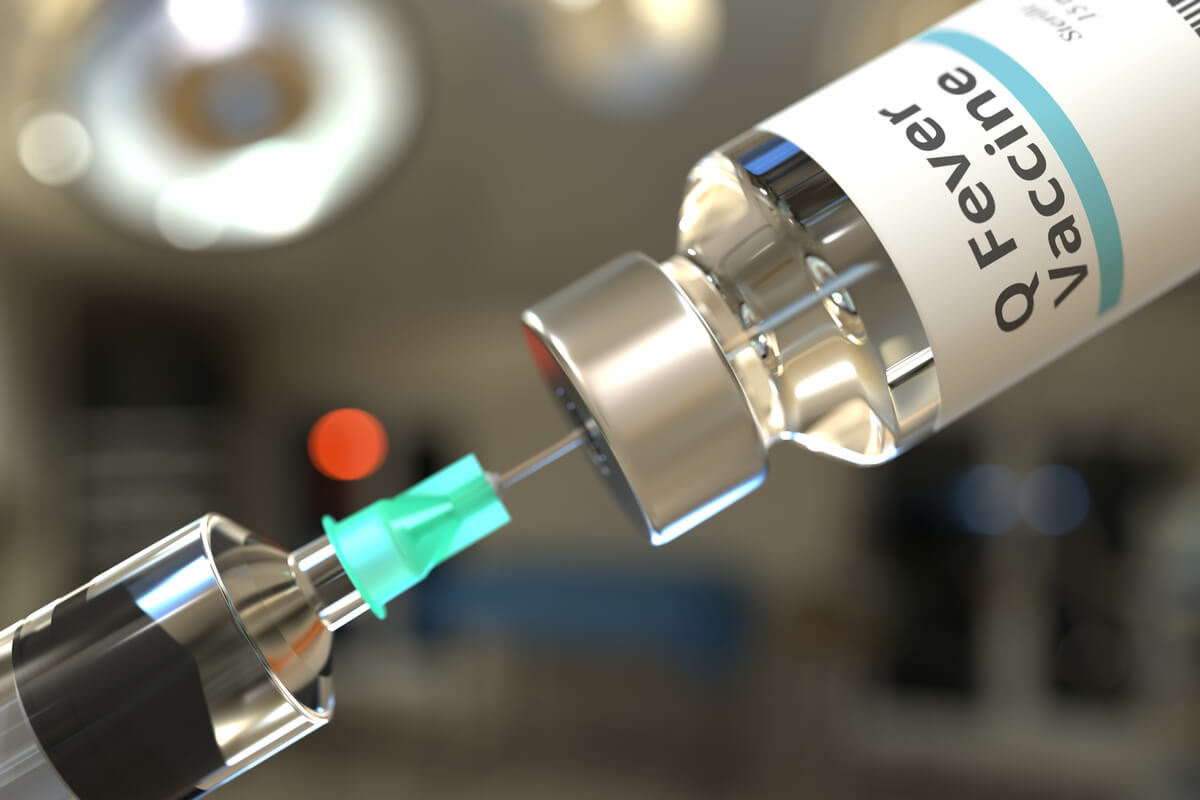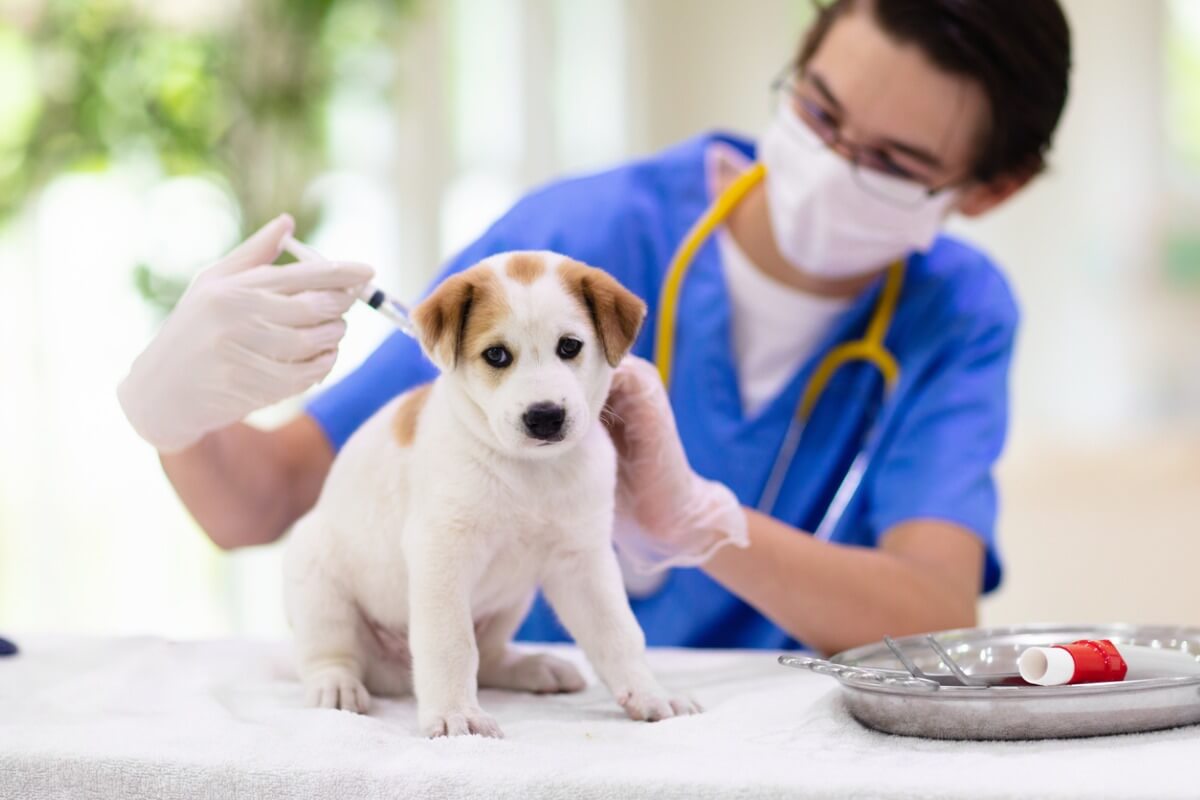Vaccination Schedule for Puppies: Everything You Need to Know


Written and verified by the biologist Cesar Paul Gonzalez Gonzalez
Vaccination is a fundamental process to maintain puppy health, so it’s always good to know in-depth their general plan. This helps to avoid several lethal diseases and to protect your pet in the long term. Looked at another way, vaccines are actually immune system boosters. Find out about the vaccination schedule for puppies in this article.
Although puppies receive their first antibodies from their mothers, these don’t last a lifetime. Because of that, you need to have a vaccination schedule that protects them against different diseases. Continue reading to find out everything you need to know about the vaccination schedule for puppies.
What are vaccines?
Vaccines are substances that stimulate your body’s production of antibodies. These are your immune system’s first line of defense, and, without them, your body wouldn’t be able to fight against viruses and bacteria. Vaccination allows the metabolism to resist “invasions” and respond efficiently to eliminate them.
Types of vaccines
There are several types of vaccines that produce immunity in your body by using different methods. Each varies in efficacy, safety, where they’re administrated, and their duration, although all of them are perfectly suited to provide protection to the puppy. Generally speaking, they can be classified as follows:
- Active immunogens: These are vaccines that contain the same pathogen that causes the disease, only its activity is reduced or partially “inactivated”. These cause a very mild infection, helping the body to generate immunity.
- Inactivated immunogens: In this type of vaccine, the causative agent is also used, but it’s completely inactivated (it is practically “dead”). In this way, the immune system can recognize the pathogen without having to suffer the disease.
- Subunit vaccines: To produce these vaccines, the pathogen is split into different individual parts, although only those that generate immunity are retained. These can range from capsids to cell walls, depending on the type of disease.
- Recombinant vaccines: New genomic technologies make it possible to artificially produce certain sections of the pathogen, which are injected into the specimen to be recognized by the immune system.

Doesn’t breast milk protect puppies?
Puppies are born without an immune system ready to defend them, so they’re overly susceptible to disease during their first days of life. In fact, it’s estimated that the mortality rate of puppies is around 20%, but more than 75% of deaths occur in the first 3 weeks.
Nature has developed different mechanisms to prevent puppies from dying prematurely. One of them is the colostrum produced by mothers during the two days after birth. This “milk” is actually a liquid with a large amount of nutrients and immunoglobulins, which become the first line of defense for the puppy.
The only problem is that the mother will only be able to protect her offspring for a few months. Therefore, it’s necessary to start preparing the puppies’ immune system to defend itself, which is achieved through a proper vaccination schedule.
The vaccination schedule for puppies in detail
The vaccination schedule for puppies may vary from country to country, as certain pathologies are likely to have a higher or lower incidence in the area. For this reason, it’s always best to consult a veterinarian to find out which vaccinations are necessary for your pet. However, to give you an idea, the general schedule for your dog could be as follows:
- 5-6 weeks: The first dose of parvovirus vaccine.
- 8-10 weeks: Administration of the so-called polyvalent vaccine containing the first specific doses to combat distemper, adenovirus type 2, infectious hepatitis C and leptospirosis, as well as the second dose of parvovirus.
- 11-13 weeks: Polyvalent vaccine is repeated for the second dose of distemper, adenovirus type 2, infectious hepatitis C and leptospirosis, and the third dose of parvovirus. Rabies vaccine (essential in some countries) can also be administered.
- 14-16 weeks: Polyvalent vaccine booster for the third dose of distemper, adenovirus type 2 and infectious hepatitis C, and the fourth dose of parvovirus.
- One year: One more booster of the polyvalent vaccine and in some cases rabies.
- An application in case of exposure (optional): Against Bordetella bronchiseptica pneumonia and parainfluenza, a single intranasal dose.
- Annual application: Only for rabies, leptospirosis, and other optional vaccines.
- Every 3 years: A polyvalent booster.
How many times should I vaccinate my puppy a year?
The first year of life you should vaccinate your pet at least 5 times, 4 times before the age of 6 months and once at one year of age. Keep in mind that this may vary depending on the area where you live. This is because some vaccines, such as rabies, may be administered earlier and could result in additional visits to the veterinarian.
However, it’s best to consult an animal health professional for a complete vaccination schedule for puppies. Some countries have legislation that makes additional vaccinations mandatory, so you need to be informed about the situation.
Are there any additional instructions?
To vaccinate your pet you don’t have to follow any additional instructions. Just make sure that your pet is in excellent health before the application. Some pathologies, such as parasitism, could reduce the effectiveness of the vaccination process. So, it’s better to visit a veterinarian beforehand for a general check-up.
Are there any side effects?
A vaccination plan is essential for every puppy’s life, as it helps them to avoid serious illness, and even death. However, vaccines aren’t exempt from undesirable side effects. Although these problems are quite rare, you need to be aware of them as a precaution. Among the most frequent symptoms are the following:
- Inflammation in the area of the injection
- Hair loss in the area of the injection
- Itching in the area of the injection
- The appearance of hives
- Diarrhea
- Vomiting
- Convulsions (this is an alarming sign)
- Arthritis
- Listlessness
- Wheezing (this is an alarming sign)
- Difficulty breathing (this is an alarming sign)

Despite these rare side effects, the vaccination schedule can mean the difference between life and death for puppies. Don’t stop vaccinating your pet just because you’re afraid. Adverse reactions can be easily controlled, but the same can’t be said for the diseases the vaccines were created for.
Vaccination is a fundamental process to maintain puppy health, so it’s always good to know in-depth their general plan. This helps to avoid several lethal diseases and to protect your pet in the long term. Looked at another way, vaccines are actually immune system boosters. Find out about the vaccination schedule for puppies in this article.
Although puppies receive their first antibodies from their mothers, these don’t last a lifetime. Because of that, you need to have a vaccination schedule that protects them against different diseases. Continue reading to find out everything you need to know about the vaccination schedule for puppies.
What are vaccines?
Vaccines are substances that stimulate your body’s production of antibodies. These are your immune system’s first line of defense, and, without them, your body wouldn’t be able to fight against viruses and bacteria. Vaccination allows the metabolism to resist “invasions” and respond efficiently to eliminate them.
Types of vaccines
There are several types of vaccines that produce immunity in your body by using different methods. Each varies in efficacy, safety, where they’re administrated, and their duration, although all of them are perfectly suited to provide protection to the puppy. Generally speaking, they can be classified as follows:
- Active immunogens: These are vaccines that contain the same pathogen that causes the disease, only its activity is reduced or partially “inactivated”. These cause a very mild infection, helping the body to generate immunity.
- Inactivated immunogens: In this type of vaccine, the causative agent is also used, but it’s completely inactivated (it is practically “dead”). In this way, the immune system can recognize the pathogen without having to suffer the disease.
- Subunit vaccines: To produce these vaccines, the pathogen is split into different individual parts, although only those that generate immunity are retained. These can range from capsids to cell walls, depending on the type of disease.
- Recombinant vaccines: New genomic technologies make it possible to artificially produce certain sections of the pathogen, which are injected into the specimen to be recognized by the immune system.

Doesn’t breast milk protect puppies?
Puppies are born without an immune system ready to defend them, so they’re overly susceptible to disease during their first days of life. In fact, it’s estimated that the mortality rate of puppies is around 20%, but more than 75% of deaths occur in the first 3 weeks.
Nature has developed different mechanisms to prevent puppies from dying prematurely. One of them is the colostrum produced by mothers during the two days after birth. This “milk” is actually a liquid with a large amount of nutrients and immunoglobulins, which become the first line of defense for the puppy.
The only problem is that the mother will only be able to protect her offspring for a few months. Therefore, it’s necessary to start preparing the puppies’ immune system to defend itself, which is achieved through a proper vaccination schedule.
The vaccination schedule for puppies in detail
The vaccination schedule for puppies may vary from country to country, as certain pathologies are likely to have a higher or lower incidence in the area. For this reason, it’s always best to consult a veterinarian to find out which vaccinations are necessary for your pet. However, to give you an idea, the general schedule for your dog could be as follows:
- 5-6 weeks: The first dose of parvovirus vaccine.
- 8-10 weeks: Administration of the so-called polyvalent vaccine containing the first specific doses to combat distemper, adenovirus type 2, infectious hepatitis C and leptospirosis, as well as the second dose of parvovirus.
- 11-13 weeks: Polyvalent vaccine is repeated for the second dose of distemper, adenovirus type 2, infectious hepatitis C and leptospirosis, and the third dose of parvovirus. Rabies vaccine (essential in some countries) can also be administered.
- 14-16 weeks: Polyvalent vaccine booster for the third dose of distemper, adenovirus type 2 and infectious hepatitis C, and the fourth dose of parvovirus.
- One year: One more booster of the polyvalent vaccine and in some cases rabies.
- An application in case of exposure (optional): Against Bordetella bronchiseptica pneumonia and parainfluenza, a single intranasal dose.
- Annual application: Only for rabies, leptospirosis, and other optional vaccines.
- Every 3 years: A polyvalent booster.
How many times should I vaccinate my puppy a year?
The first year of life you should vaccinate your pet at least 5 times, 4 times before the age of 6 months and once at one year of age. Keep in mind that this may vary depending on the area where you live. This is because some vaccines, such as rabies, may be administered earlier and could result in additional visits to the veterinarian.
However, it’s best to consult an animal health professional for a complete vaccination schedule for puppies. Some countries have legislation that makes additional vaccinations mandatory, so you need to be informed about the situation.
Are there any additional instructions?
To vaccinate your pet you don’t have to follow any additional instructions. Just make sure that your pet is in excellent health before the application. Some pathologies, such as parasitism, could reduce the effectiveness of the vaccination process. So, it’s better to visit a veterinarian beforehand for a general check-up.
Are there any side effects?
A vaccination plan is essential for every puppy’s life, as it helps them to avoid serious illness, and even death. However, vaccines aren’t exempt from undesirable side effects. Although these problems are quite rare, you need to be aware of them as a precaution. Among the most frequent symptoms are the following:
- Inflammation in the area of the injection
- Hair loss in the area of the injection
- Itching in the area of the injection
- The appearance of hives
- Diarrhea
- Vomiting
- Convulsions (this is an alarming sign)
- Arthritis
- Listlessness
- Wheezing (this is an alarming sign)
- Difficulty breathing (this is an alarming sign)

Despite these rare side effects, the vaccination schedule can mean the difference between life and death for puppies. Don’t stop vaccinating your pet just because you’re afraid. Adverse reactions can be easily controlled, but the same can’t be said for the diseases the vaccines were created for.
All cited sources were thoroughly reviewed by our team to ensure their quality, reliability, currency, and validity. The bibliography of this article was considered reliable and of academic or scientific accuracy.
- Mila, H., Grellet, A., Delebarre, M., Mariani, C., Feugier, A., & Chastant-Maillard, S. (2017). Monitoring of the newborn dog and prediction of neonatal mortality. Preventive Veterinary Medicine, 143, 11-20.
- Cossío, T. L. I., Bobadilla, J. A., Alcántara, F. J. B., Guerrero, J., & de Morais, H. A. (2017) Guías de Vacunación para perros y gatos Parte 1 COLAVAC-FIAVAC-México. Recuperado el 27 de enero de 2022, disponible en: http://www.fiavac.org/pdf/guias_mexico.pdf
- Cossío, T. L. I., Bobadilla, J. A., Alcántara, F. J. B., Guerrero, J., & de Morais, H. A. (2017) Guías de Vacunación para perros y gatos Parte 2 COLAVAC-FIAVAC-México. Recuperado el 27 de enero de 2022, disponible en: https://www.vanguardiaveterinaria.com.mx/guias-de-vacunacion-colavac-fiavac
This text is provided for informational purposes only and does not replace consultation with a professional. If in doubt, consult your specialist.








